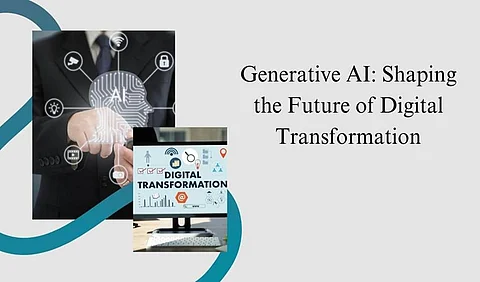

In the rapidly evolving digital landscape, Generative AI (GenAI) is redefining how businesses operate, automate, and innovate. Saurabh Garg, a leading expert in the field, explores the role of GenAI in digital transformation, shedding light on its potential to revolutionize industries while also addressing its inherent challenges. With its ability to enhance efficiency, drive decision-making, and optimize operations, GenAI is rapidly becoming an indispensable tool for enterprises aiming to stay ahead in the digital age.
The so-called traditional digital transformation has usually been imagined through limited and inflexible models. GenAI brings along self-learning dynamic models that continuously learn from real-time data. Their entry brings organizations into a new world where they can better navigate the complexities of their business environments and decision-making and operational efficiency. AI Trust, Risk, and Security Management (AI TRiSM) ensure the accuracy, better adoption, and better business results further. The transition from a rigid to a dynamic design values agility in a competitive environment.
Among the many remarkable applications of GenAI is its capability for scenario simulation prior to business execution. Highly advanced AI modeling empowers organizations to critically examine their strategies, foresee possible risks, and optimize the allocation of resources. Research shows that AI simulation can cut project complexity by 45% and improve alignment of stakeholders by 60%, which undoubtedly renders it an important strategic tool. In addition to this, organizations utilizing AI simulation report operational cost savings of 30% to 50% and a major increase in productivity. Such capabilities enable firms to actively prepare for potential difficulties that will assure an easy transition during the initiation of a digital project.
GenAI’s impact extends beyond automation; it transforms business case development through advanced analytics and interactive modeling. Analytics driven by AI facilitate faster data processing, better predictive modeling, and the unveiling of hidden patterns in historical data. Reports from organizations utilizing GenAI-powered stakeholder engagement tools reflect higher efficiencies in decision-making and reduced resistance toward digital transformation initiatives. Also, GenAI allows organizations to simulate business case scenarios using justifiable investment considerations, providing assurances that digital initiatives will be aligned with the long-term strategic objectives.
Integrating GenAI into existing digital systems remains challenging, albeit promising. Many an organization faces hurdles arising from data quality, readiness for infrastructure, and shortage of AI talent. Reportedly, about 82% of enterprises find sourcing AI experts a challenge-your general belief, therefore, competes against every other company trying to do the same-with this increased demand pushing up both competition and salary premiums for skilled professionals. The situation is compounded by rising concerns about data governance and ethical AI implementation, with 73% of companies not having any AI governance strategy worth the name. Addressing these challenges will mean investing in AI education, upgrading existing infrastructures, and adopting advocacy and proper governance frameworks.
One of the most revolutionizing facets of GenAI is probably AI-enabled decision-making. Such organizations usually turn out to be best businesses in operation efficiency, with all the subsequent improvements in customer engagement and a potentialized strategic plan. By automating routine human processes, AI has reduced the incidence of human error and increased productivity, wherein resources can be directed to core activities. AI analytics and automation create responsive, efficient enterprises based on an ability to adapt to market developments.
As the evolution of AI progresses, businesses must next gear up for the integration of GenAI into their operations. According to the future trends that are observed, AI-created applications will make over 30% of new software solutions by 2025 and will enable core adoption by fundamentally reconfiguring digital workflows.
In addition, shifting to multimodal AI-an AI that can digest text, images, audio, and video simultaneously-would be another way to develop business applications in a more sophisticated way.
The estimated annual worldwide economic potential from GenAI is between $2.6 trillion to $4.4 trillion and can reshape the future; therefore, spending now as an organization into its collection strategy for AI transformation would prepare it better for the sustainable future.
Now, GenAI requires responsible development methodologies before it can be embraced and integrated into the companies' functional processes. Some of the key ethical issues will be data protection, counteracting biases, and ensuring transparency. Organizations that set up good governance policies for AI will not only comply with regulations, but also build confidence among consumers and stakeholders. Hence good ethical frameworks will facilitate adoption of GenAI by organizations, while minimizing the risk of AI-influenced decision-making.
The path to adopting Generative AI on a large scale involves some main steps: workforce training so that employees can use AI tools effectively; collaboration with IT leaders so that the incorporated AI becomes part of the existing digital infrastructure; strategizing-business alignment with longer-term goals when it comes to leveraging AI-for-most-much beneficial transformation advantage-minimally disruptive.
The landscape of digital transformation is ever-changing due to generative AI. As it automates everything and raises efficiency levels, it presents technical, ethical, and governance challenges that must be resolved for success. According to Saurabh Garg, an industry leader on the topic, structured and responsible approaches are needed to ensure lasting impact in terms of innovation, ethical AI adoption, and long-term growth by businesses in a continually evolving digital era.
